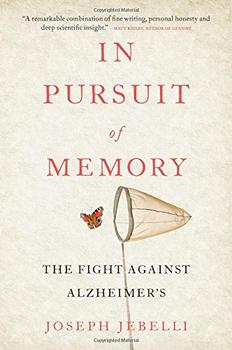Summary | Excerpt | Reviews | Beyond the Book | Readalikes | Genres & Themes | Author Bio

The Fight Against Alzheimer's
by Joseph Jebelli
In recent years, cases from the echelons of high society have reached our ears as well. Rita Hayworth, Peter Falk, Charlton Heston, Rosa Parks, Margaret Thatcher–all eventually developed Alzheimer's. When President Ronald Reagan was diagnosed, in November 1995, he published a handwritten letter to the American public: 'At the moment I feel just fine. I intend to live the remainder of the years God gives me on this earth doing the things I have always done… Unfortunately, as Alzheimer's disease progresses, the family often bears a heavy burden. I only wish there was some way I could spare Nancy from this painful experience.'
As anyone who has known a patient understands, Alzheimer's is a merciless disease. It strips the mind of decades of stored memories that have been sculpted and embedded deep within our brains. Slowly and steadily, it erodes an individual's autobiography, the very narrative that defines who we are. In his book The Emperor of All Maladies, Siddhartha Mukherjee describes cancer as 'a distorted version of our normal selves', 'an individual–an enigmatic, if somewhat deranged, image in a mirror'. Perhaps, using this analogy, Alzheimer's is the absence of a reflection altogether–a shadowy abyss that disengages a person from the world.
When I set out to study Alzheimer's, it was for personal reasons. I never expected to cure the malady myself, but I did want to understand what happened to my grandfather after having to watch his memory disappear in this way. I learned quickly that the science behind the disease is still shrouded in mystery. Professor Alois Alzheimer, the eponymous German psychiatrist who first described it in 1906, called it 'a peculiar disease'. He was referring mainly to its underlying pathology. Through the microscope Alzheimer had observed numerous plaques and tangles of an unknown substance. But he didn't know whether they were the disease's root cause or just an after-effect. This question has remained unanswered, and we still know very little about what causes brain cell death on such a massive scale.
Here is what we do know. A person with Alzheimer's is not 'just getting old'. Their brain is under attack. A host of killer proteins has been unleashed–insidious black stains known as plaques and tangles. After gestating in the brain for years, perhaps decades, they will spread and hollow it out. In the hippocampus, a brain region crucial for memory, the plaques start by destroying the brain's ability to create new memories by disrupting the electrical signals between neurons. As they grow in number, the plaques eventually trigger the rise of tangles–deformed proteins that completely unravel the neurons' internal transport mechanism. The ensuing neurotoxic storm then causes the brain's immune system to activate. But the damage is irreparable, and even our brain's best efforts to remedy the affliction are insufficient. One by one, like a chain of dominoes, neurons continue to fall. In only a few years after symptom onset, neurons in the frontal lobe and cerebral cortex will start to perish, disrupting mood, spatial awareness, face-recognition and long-term memory. Six to eight years is usually how long it takes. The result is a brain the weight of an orange, having shrunk at three times the rate of normal ageing.
But there is hope. Today, advances in genetics and cell biology are changing the conceptual landscape of Alzheimer's disease. Research has become highly collaborative: last year, for instance, more than 200 researchers from across Europe and the US worked together on a genetic study using 70,000 patients. The effort uncovered eleven new genes linked to Alzheimer's disease, and armies of scientists continue to mobilise around the world in a concerted effort to unmask and disarm it. This book is, in part, a look at the fascinating and utterly important work they are doing.
Excerpted from In Pursuit of Memory by Joseph Jebelli. Copyright © 2017 by Joseph Jebelli. Excerpted by permission of Little Brown & Company. All rights reserved. No part of this excerpt may be reproduced or reprinted without permission in writing from the publisher.
Your guide toexceptional books
BookBrowse seeks out and recommends the best in contemporary fiction and nonfiction—books that not only engage and entertain but also deepen our understanding of ourselves and the world around us.